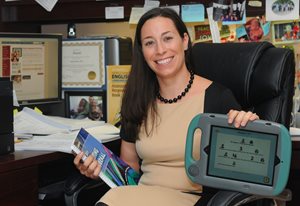Providing Grade Aligned Access to the General Curriculum: Why and How
Presentation Slides
Pamela Mims, Ph.D. and Ginevra Courtade, Ph.D.
Using best-practices and supports that apply the least dangerous assumption (LDA) is a powerful tool for increasing overall student quality of life and keeping alive a vision of high achievement for all students. This presentation will focus on strategies to promote the LDA for students with moderate/severe intellectual disability and autism when teaching grade aligned content. Specifically, presenters will share the history and importance of access to the general curriculum, systematic instructional strategies to promote skill acquisition in grade aligned content, and the use of data-based decisions to guide meaningful instruction.
Credits: Act 48, ASHA, Psych
Audience: Special Education Teachers; Teachers who work with students who are blind or visually impaired; Teachers who work with students with hearing loss; Teachers who work with students who are Deaf-Blind; Teachers/other professionals who work with students who have sustained a traumatic brain injury; Speech Therapists; General Education Teachers; Supervisors/ Administrators; Assistive Technology Specialists; School Counselor; School Psychologists; Parents/Guardians/Family Members; Paraprofessionals
Speaker Bios: Dr. Pamela Mims is the Associate Dean of Research and Grants as well as Associate Professor of Special Education in the College of Education at East Tennessee State University. She received her PhD in Special Education from the University of North Carolina at Charlotte. Prior to her time in academia, Dr. Mims served as a teacher for students with severe, multiple disabilities for 7 years. Her areas of interest/research include: students with significant intellectual disability and autism, access to the general curriculum, and systematic instruction. Dr. Mims has numerous publications including peer reviewed articles, book chapters, and curriculum on the topics of systematic instruction and access to the general curriculum for students with significant disabilities. She has spent extensive time writing extended content standards for state departments of education, as well as training educators and administrators on alternate assessments within the United States. She recently served as the Principal Investigator on an IES SBIR Research Grant, Access: Language Arts. which focused on developing and researching technology supports for access to grade aligned language arts for students with low incidence disabilities. Dr. Mims continues to conduct research and provide professional development nationally and internationally.
 Ginevra R. Courtade
Ginevra R. Courtade is an associate professor and chair of the Department of Special Education at the University of Louisville. Dr. Courtade has worked in the field of moderate to severe disabilities for 20 years. Her work focuses specifically on teaching academics to students with moderate to severe disabilities and preparing teachers to instruct students in the general education curriculum using evidence-based practices. She has numerous publications to her credit, including Early Literacy Skills Builder, Teaching to Standards: Science, Aligning IEPs to the State Standards, and 6 Successful Strategies for Teaching State Standards to Students with Moderate to Severe Disabilities.
Dr. Courtade received her bachelor’s degree in psychology from the State University of New York at Buffalo, her master’s degree in special education from D’Youville College, and her doctoral degree in special education from the University of North Carolina at Charlotte. Prior to her current position, Dr. Courtade spent two years at West Virginia University, where she served as an assistant professor in special education.
Currently, Dr. Courtade works closely with the Kentucky Department of Education to provide training and support to new teachers of students with moderate to severe disabilities. She also trains teachers nationally to implement academic curricula for their students.
